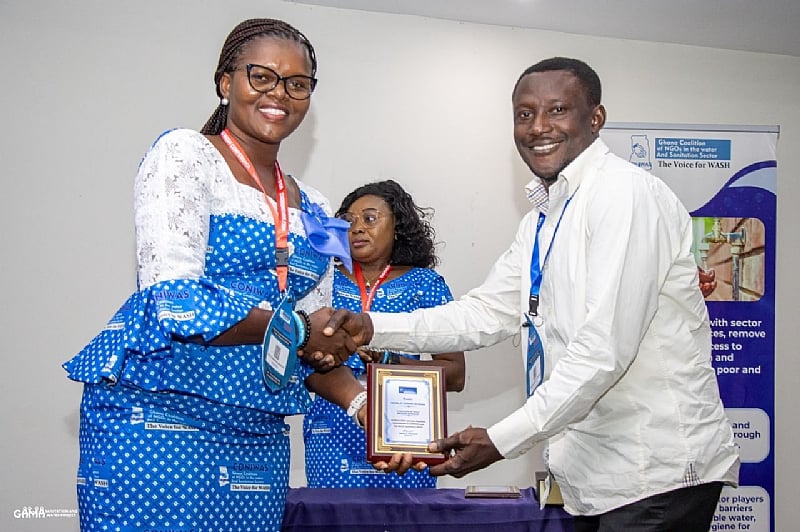The Ghana Coalition of NGOs in Water and Sanitation (CONIWAS) has raised alarm over the detrimental impact of illegal mining activities, commonly known as Galamsey, on the country’s vital water bodies. Key rivers, including the Pra, Ankobra, Birim, and Offin, have suffered severe contamination with hazardous chemicals. This contamination poses profound long-term health risks, as articulated by Ms. Beata Awinpoka Akanyani, the Chairperson of CONIWAS. She emphasized that such pollution not only threatens the health of the population—particularly vulnerable groups like pregnant women and children—but also contributes to various waterborne diseases and respiratory conditions. Sadly, the adverse effects of contaminated water extend beyond health risks; they exacerbate existing socio-economic challenges by increasing water treatment costs, placing a disproportionate burden on the poor and marginalized communities.
The concerns highlighted by CONIWAS were prominently discussed at the recent MOLEXXXV conference, which took place in Ho, the Volta Regional Capital, from October 6th to October 11th. Titled “Looking Back on SDG 6 Implementation in Ghana: Progress, Challenges, and Ways Forward,” the conference brought together various stakeholders to reflect on the country’s progress towards achieving Sustainable Development Goal 6 (SDG 6) related to water and sanitation. The conference focused on multiple thematic sub-themes, including institutional alignments and effective strategies crucial for ensuring that every Ghanaian has access to clean and safe water. As part of this dialogue, the Child Sanitation Diplomat, Master Abdul Yazid Faraj Timtoni Wumbei, represented children’s interests, taking part in activities to promote awareness of sanitation and water issues among the youth.
During the event, the Minister of Sanitation and Water Resources, Ms. Lydia Seyram Alhassan, not only opened the conference but also inaugurated a WASH (Water, Sanitation, and Hygiene) Sector stakeholders’ exhibition. This exhibition featured a range of organizations, including the GAMA/GKMA Sanitation and Water Project and WaterAid, creating a platform where stakeholders could showcase their products and engage with participants effectively. The conference showcased a commitment among various organizations to prioritize the attainment of SDG 6, emphasizing the collective responsibility of stakeholders in enhancing water and sanitation services throughout Ghana. The outcomes of the conference underscored the urgent need for collaborative approaches to address ongoing challenges in the WASH sector.
In light of the discussions at the conference, CONIWAS expressed its resolve to advocate for clear governmental action aimed at safeguarding freshwater resources. This commitment was encapsulated in a promise to issue a press statement aimed at rallying support from citizens, traditional authorities, and the media in efforts to conserve Nigeria’s natural resources and improve the quality of drinking water. The determination of CONIWAS to influence policy and public awareness underlines a broader initiative to mobilize civil society organizations and stakeholders throughout the nation to take proactive measures in battling the effects of illegal mining on water resources.
The MOLEXXXV Conference concluded with a reaffirmation of Ghana’s priority to fulfill the objectives outlined in SDG 6. There was a collective agreement amongst participants to adopt specific recommendations to monitor the country’s commitments to providing equitable and sustainable WASH services. This included a commitment to hold the government accountable for progress in this area and to ensure stakeholders work collectively to achieve the SDGs. The conference not only served as a reflection on past achievements and challenges but also laid the groundwork for future actions geared at enhancing water supply and sanitation services across Ghana.
Recognizing commitment and innovation within the WASH sector, the conference also honored twelve institutions for their efforts. The GAMA/GKMA Sanitation and Water Project received the headline sponsorship award, with other organizations like IRC Ghana, World Vision Ghana, and UNICEF also recognized for their significant contributions. Various sponsorship levels were acknowledged, showcasing a community of stakeholders committed to advancing water and sanitation in Ghana. Key speakers at the conference included prominent figures from the academic, governmental, and organizational spheres, emphasizing the multi-faceted approach required to make strides in the WASH sector and stressing the collaborative spirit essential for driving impactful change.
In summary, the ongoing challenges posed by illegal mining in Ghana highlight the urgent need for improved water governance and environmental protection measures. The MOLEXXXV conference provided a significant platform for stakeholders in the WASH sector to collaboratively assess their progress in achieving Sustainable Development Goal 6. As CONIWAS and other organizations strive to combat the negative effects of Galamsey and advocate for cleaner water, it is evident that a united effort involving the government, civil society, and the community at large is essential to safeguard Ghana’s water resources and promote public health.














